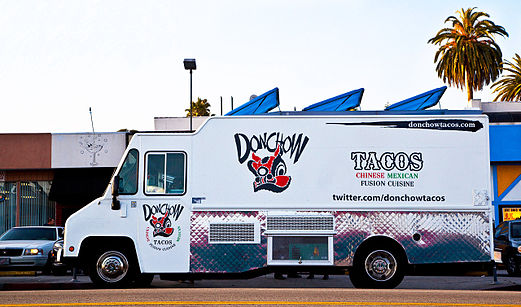Officials from the Board of Health Wednesday proposed rules and regulations for mobile food vehicles, addressing major safety and fire concerns they have noticed in collaboration with the Chicago Fire Department.
In July, The Chicago City Council voted 44-1 in favor of adopting an ordinance for new rules for the regulation of food truck vendors. If the regulations are approved by the Board of Health on Dec. 19, the law would take effect immediately.
The new rules, shared Wednesday with the health board include a GPS monitoring system to ensure that trucks are at least 200 feet away from a brick and mortar restaurant, and that they are not overstaying their two-hour limit, among other things. If approved, mobile food trucks will be able to prepare food directly on the truck, as opposed to in a stationary kitchen.
“The idea behind GPS tracking is that the city will have a knowledge of where these mobile food vehicles are,” said Dr. Cort Lohff, the city’s medical director of Environmental Health.
The Board of Health, in conjunction with Chicago Fire Department crafted a number of regulations that will address numerous safety issues related to propane tanks, natural gas tanks, generators and fire suppression equipment.
“If vendors will be using propane or natural gas tanks to prepared the food, the mounting of the tanks must withstand impact equal to four times the weight of the filled propane or natural gas containers,” according to the new rules and regulations implemented for the mobile food vehicles.
“We recognized that there were tremendous amount of gaps in the fire safety issues,” Lohff said.
The possibility of a mobile food vendor to drop a propane tank and have it explode, or have a vehicle crash into a mobile food truck that has exposed propane tanks on the outside of the truck is just one of the concerns looming over the Chicago Fire Department, said Lohff to the Board of Health members.
According to Lohff, until these rules and regulations are voted on, no mobile food vendor is allowed to cook directly on the truck.
In order to cook the food on the truck, mobile food vendors will have to obtain a special license, which will cost $1,000 more than the license to sell only packaged food. Accordingly, vendors will have to revamp their trucks with more modern equipment to meet the regulations, which can cost thousands of dollars.
“We’ve been preparing and cooking on the truck for like 10 months,” said Jimmy Nuccio, co-owner of Beavers Coffee and Donuts. “We’re in the process of getting the new license.”
Beth Kregor, director of the Institute for Justice Clinic on Entrepreneurship at the University of Chicago Law School, sees the GPS and propane tank regulation as more of a nuisance and burden than Nuccio.
“These are extraordinarily invasive measures,” said Kregor, whose office offers free legal advice and assistance to low-income entrepreneurs in Chicago, including mobile food truck vendors. “It seems quite clear that the city is doing this to satisfy the Illinois Restaurant Association.”
The Illinois Restaurant Association was reached by Chicagotalks reporters but could not provide immediate comment on the issue.
According to Kregor, Chicago is the last major city to allow cooking on board the trucks. Los Angeles, Austin, New York and Columbus are some of the major urban cities that have allowed cooking on trucks with less imposition than Chicago is proposing.
“I don’t know if Chicago can have a thriving mobile food truck scene because of these regulations,” Kregor said.













Be First to Comment